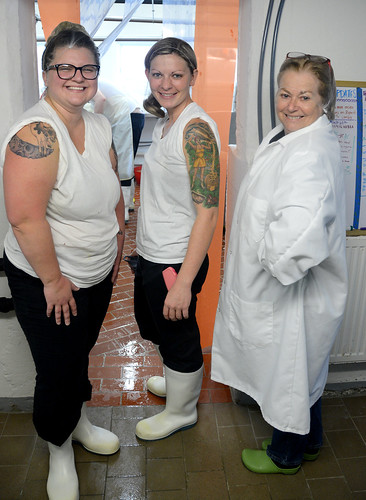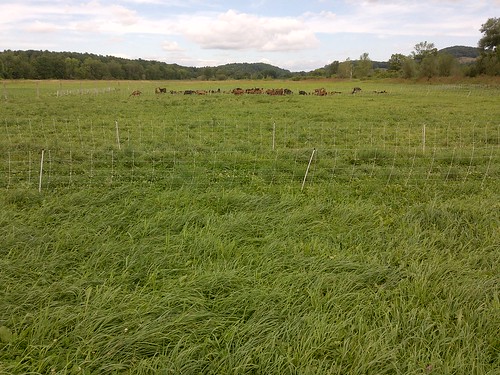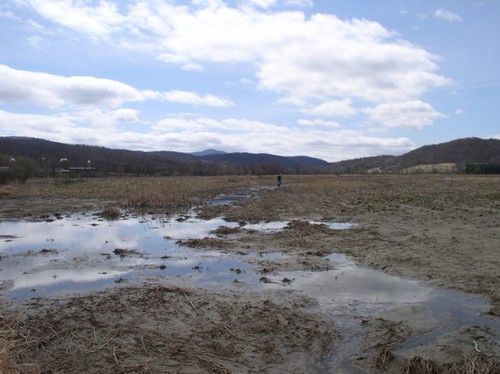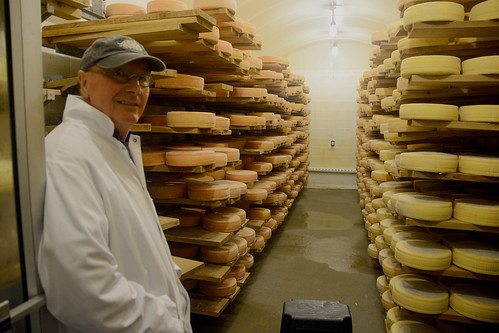
Cheesemakers left to right: Creamery Manager and Head Cheesemaker Leslie Goff (center) with Consider Bardwell owner Angela Miller (right) and cheesemaker Anastasia Barrett. Photo: Amy Overstreet, NRCS Vermont.
The story behind Vermont’s Consider Bardwell could be the plot for a great movie. The lead characters are Russell and Angela, two New York City executives who decide in their fifties that they want to buy a farm, raise goats, and be artisan cheesemakers. The setting is a 300-acre dairy farm and cheese operation in West Pawlet, Vermont. And the twist…they had no previous farming experience.
What could have been a comedy is an inspiring story of dedication and perseverance. This is the true tale of an architect and a literary agent who pursue a dream to farm sustainably through a voluntary conservation approach, and create a unique farm-to-plate product. Their partnership with USDA’s Natural Resources Conservation Service (NRCS) is helping to ensure the health of the natural resources on their farm.
When the couple visited friends in Dorset, Vermont, in 2000, they were inspired to search for their own farmstead, and discovered a beautiful property straddling Vermont and their home state of New York. A short year later, they connected with local NRCS Soil Conservationist Sally Eugair to improve the farm through conservation supported by Farm Bill programs.

With technical and financial assistance from USDA-NRCS, 195-acres of cornfields were planted to grass to provide a healthy and sustainable forage source for the health of the goats which provide milk for the cheese. Photo: Amy Overstreet, NRCS Vermont.
Russell and Angela started from scratch when they made the decision to revive the farm, and embarked on a quest to teach themselves everything they could about the land management and cheesemaking.

With technical and financial assistance from USDA-NRCS, 195-acres of cornfields were planted to grass to provide a healthy and sustainable forage source for the health of the goats which provide milk for the cheese. Photo: Amy Overstreet, NRCS Vermont.
Eugair helped enroll them in the Agricultural Conservation Easement Program (ACEP) which allowed them to permanently protect 195-acres of healthy grazing lands for their herd of Oberhasli goats. Then, they converted all the continuously cropped cornfields to lush, healthy grasslands—providing a healthy and sustainable forage source for their goats and protecting nearby water quality.
“The grasslands also provide a valuable nesting and breeding area for many bird species,” explained Eugair.
The Environmental Quality Incentives Program (EQIP) plan included well-managed grazing systems that improve the health and vigor of plants, enhance water quality, and reduce soil erosion. Their prescribed grazing plan allows the grass to recover while paddocks are resting and encourages the animals to uniformly graze.
Last year, they made more than 97,000 pounds of cheese from the milk of 150 goats and 65 cows without pesticides or fertilizers. And, their cheeses have been winning national and international awards for the past ten years—and their product is served in some of the nation’s finest restaurants. Today, they have a full-time staff of 20, including three cheesemakers who produce small batches of cheese from unpasteurized milk that is antibiotic and hormone free.

Russell’s skills as an architect were useful in the design of Consider Bardwell’s special caves where cheese is aged to perfection. Photo: Amy Overstreet, NRCS Vermont.
When asked about the future of the business, Angela and Russell hope to expand. “We are not the kind to retire,” they explain. Both still maintain their full-time jobs as an architect and a literary agent. Russell says he believes part of their success is due to their ‘vertically integrated business’ approach. “We raise the animals, make the cheese with milk that we produce, and personally take our product all the way to the consumers.” They believe this is important to their customers who are more aware of how their food is produced. And, their dedication to voluntary conservation is ensuring that the natural resources at Consider Bardwell will be healthy and vibrant for generations to come.
No comments:
Post a Comment
Note: Only a member of this blog may post a comment.